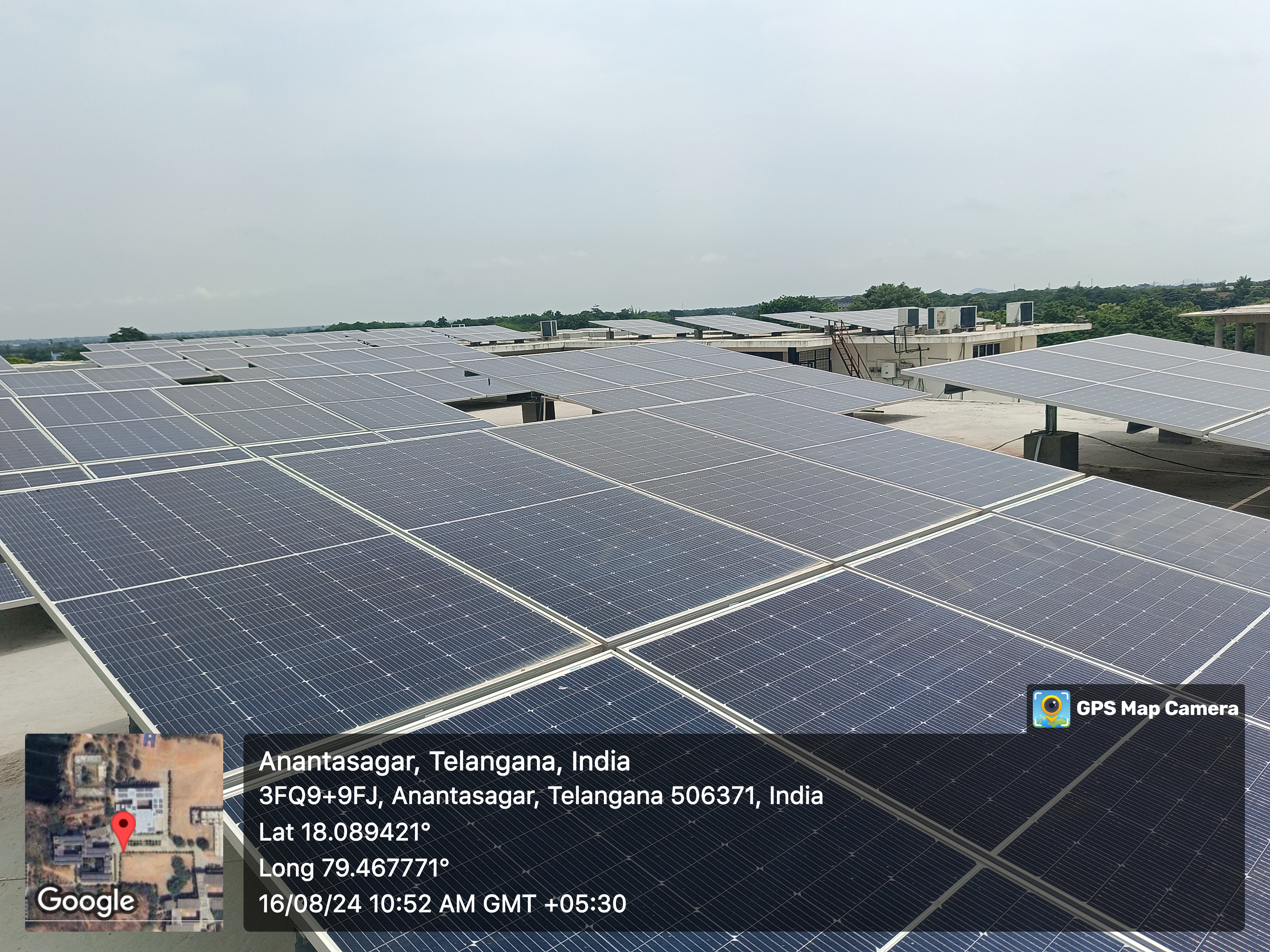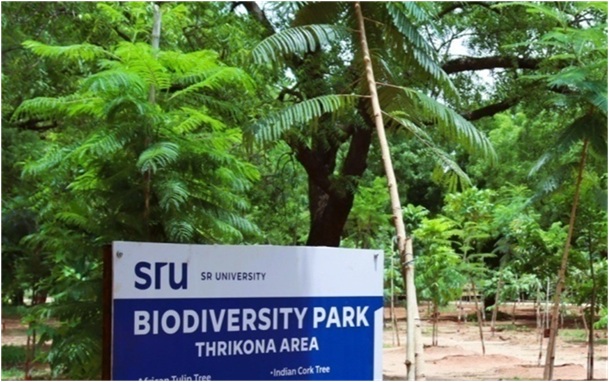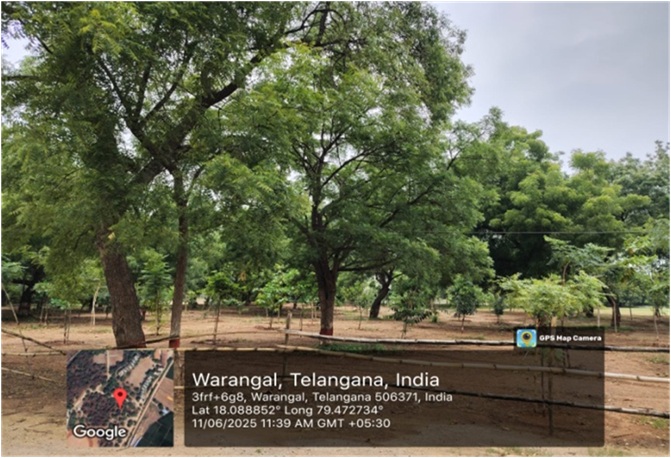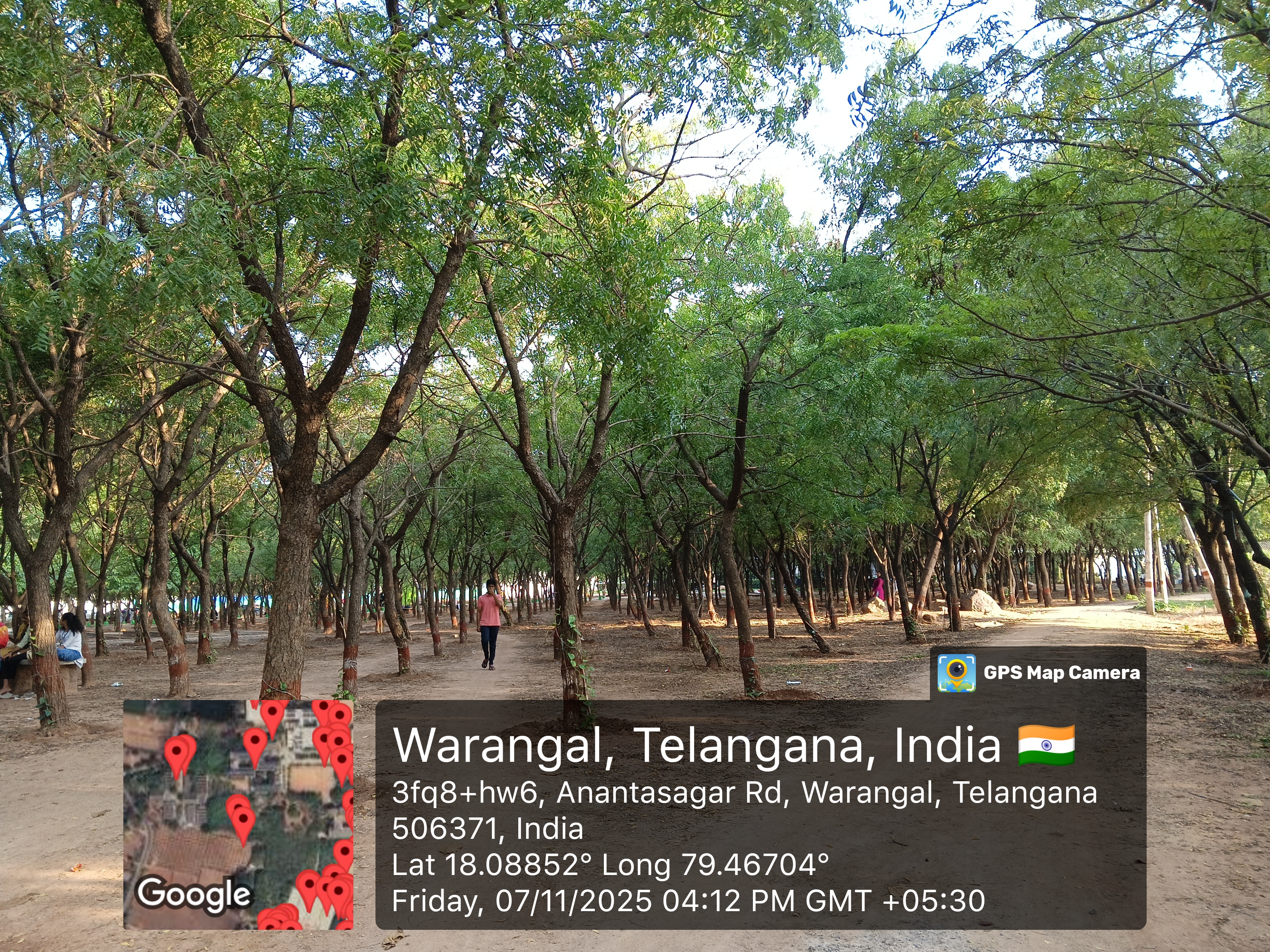SR University (SRU) is committed to advancing comprehensive climate action through sustainable energy management, climate education, disaster preparedness, and community- centred resilience initiatives. The University’s strategies are aligned with sustainability frameworks and global climate resilience priorities. With strong governance mechanisms, evidence-based planning, and multi-stakeholder engagement, SRU aims to build a climate- smart campus and empower communities to adapt to emerging climate risks.
SR University has established a strong institutional framework to guide its climate action commitments. The Energy Policy provides clear directives on energy consumption, efficiency enhancement, renewable-energy adoption, and climate-change mitigation. The policy supports systematic monitoring of campus-wide energy usage and sets measurable targets for reducing carbon emissions, thereby ensuring accountability and long-term sustainability planning.
The University has developed a comprehensive Climate Action Plan, outlining strategies for mitigation, adaptation, and resource management. A key institutional commitment under this plan is SRU’s ambition to become a Zero Carbon Emission Campus by 2031. This goal is pursued through expansion of renewable energy systems, sustainable mobility initiatives, and improved waste and water management.
SRU conducts independent energy and environmental audits, undertaken through certified external agencies. These audits assess energy performance, greenhouse gas emissions, water- use efficiency, waste management practices, and compliance with environmental regulations. Audit findings are integrated into annual improvement plans and inform the University’s participation in UI GreenMetric, NIRF, and global sustainability assessments. The University also follows Scope 1, Scope 2, and Scope 3 emission monitoring in line with the Greenhouse Gas Protocol, ensuring accurate reporting of direct emissions, purchased energy emissions, and indirect emissions from commuting, waste, and procurement. These assessments support transparent tracking of carbon neutrality progress.
SR University has made significant investments in low-carbon energy systems to reduce dependence on fossil fuels and minimize its greenhouse gas footprint. Solar photovoltaic installations across campus buildings contribute a substantial share of the University’s energy requirements. SRU systematically measures the solar power generated, tracks energy consumption patterns, and records the excess renewable energy supplied back to the state electricity grid, demonstrating its role as a clean-energy contributor.
The University prioritizes energy-efficient infrastructure by implementing LED lighting, smart meters, and green-building standards. These initiatives are tracked through annual sustainability audits to ensure continued improvement and optimal performance. Complementing these efforts, SRU offers a Postgraduate Program in Renewable Energy, designed to develop skilled professionals in solar, wind, biomass, and sustainable power systems. The curriculum integrates practical training, research exposure, and start-up incubation to support India’s clean-energy transition.

Climate education is embedded across academic programmes at SR University. Courses related to climate science, environmental sustainability, disaster preparedness, and renewable energy are incorporated into multiple undergraduate curricula, ensuring that students from diverse disciplines gain foundational knowledge on climate change. The Civil Engineering Department, NSS, and the Sustainability Club organize regular educational programs, workshops, seminars, hands-on training, and community outreach activities on climate risks, mitigation strategies, adaptation practices, and early-warning preparedness. These programmes strengthen climate literacy among students, faculty, and local communities.
SR Innovation Exchange (SRiX) promotes start-ups focused on sustainability, clean technology, environmental monitoring, and climate solutions. Through mentorship, access to facilities, and industry partnerships, SRiX enables innovators to develop impactful technologies that support climate adaptation and mitigation in rural and urban settings. The University is equipped with a campus meteorological and weather-reporting station, which captures real-time data on temperature, humidity, rainfall, wind speed, and atmospheric conditions. This data is shared with researchers, students, and surrounding communities to support climate risk assessment, weather forecasting, and agricultural planning.
SR University actively collaborates with local villages, NGOs, and community groups to strengthen regional climate resilience. These partnerships support awareness campaigns, tree- planting drives, disaster-preparedness training, water conservation initiatives, and climate- smart agricultural practices. The NSS Unit and the Sustainability Club conduct numerous programmes on climate change awareness, carbon-footprint reduction, and environmental stewardship. Activities include student-led campaigns, green drives, village outreach programmes, and community preparedness workshops for floods, heatwaves, and extreme weather events.
SRU contributes expertise to government-led climate initiatives through faculty participation in environmental impact assessments, climate modelling projects, and disaster management consultations. Through cooperative planning with local authorities, SRU supports early-warning systems, extreme-weather preparedness, and community-level resilience-building. The University also hosts expert lectures and training sessions to promote integrated climate action across sectors.
SR University places strong emphasis on enhancing green cover and protecting biodiversity as a natural solution to climate mitigation. Around 10,000 neem trees, a species known for its low water requirement, high carbon-sequestration capacity, and air-purifying characteristics, have been planted across the campus. These plantations significantly improve air quality, provide shade, and support long-term carbon reduction. In addition, SRU maintains a Biodiversity Park that conserves native flora, supports pollinators, and offers an ecological learning space for students and researchers. The park contributes to micro-climate stabilization, soil conservation, and ecological balance within the campus. Afforestation, campus greening initiatives, and nature-based solutions form an integral part of SRU’s carbon neutrality roadmap. These efforts complement renewable-energy expansion and emission-reduction strategies to advance a low- carbon campus model.



SR University’s long-term climate strategy is anchored in its commitment to achieving Zero Carbon Emission Status by 2031. This goal is supported through:
Regular monitoring and evaluation mechanisms ensure that SRU’s carbon neutrality roadmap evolves with technological advancements, new regulatory frameworks, and emerging sustainability priorities.
SR University’s commitment to SDG 13 goes beyond compliance - it reflects a holistic strategy integrating energy transition, climate resilience, ecological stewardship, and community impact. With clear goals, strong governance, and an inclusive approach, SRU continues to lead as a climate-responsible institution dedicated to protecting the planet for future generations.